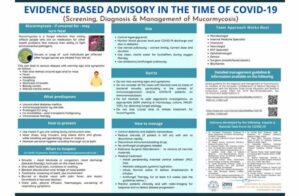Amid the increasing cases of Covid-19 in the country, several states in India are seeing a rise in cases of black fungus or ‘Mucormycosis’ – infections in patients diagnosed with coronavirus. The infections emerge two weeks after the patient has recovered from Covid-19.
The Indian Council of Medical Research (ICMR) has released guidelines for screening, diagnosing, and managing this infection. According to the ICMR, Mucormycosis, which is also called a fungal infection, mainly affects people who are on medication for other health conditions that hamper their ability to fight the environmental pathogens.
What is Black Fungus?
According to the Union Health Ministry, black fungus or mucormycosis is a fungal infection that majorly affects people who are on medication that reduces their capability to fight environmental pathogens. Sinuses or lungs of the individuals who get affected after fungal spores are inhaled from air and if not cared for properly it may turn fatal.
Though it is very rare but it can lead to loss of the upper jaw and sometimes even the eyes. Hence, some warnings signs must be taken care of like pain and redness around the eyes and/or nose, fever, headache, coughing, shortness of breath, bloody vomit and altered mental status.

Symptoms Of Black Fungus
According to ICMR’s guidelines:
- Pain and redness around eyes and/or nose
- Fever, Headache, Coughing
- Shortness of breath
- Bloody vomits
- Altered mental status
When To Suspect
- Sinusitis-nasal blockade or congestion
- Nasal discharge (blackish/bloody)
- Local pain on the cheek bone
- One sided facial pain, numbness or swelling
- Toothache
- Blurred or double vision with pain
- Chest pain, worsening of respiratory symptoms
Who Are At Risk
- Those with uncontrolled diabetes mellitus
- Immunosuppression by steroids
- Prolonged ICU stay
- Comorbidities-post transplant/malignancy
What To Do
- Control hyperglycemia
- Monitor blood glucose level post-covid-19 discharge
- Use steroid judiciously-correct timing, dose, and duration
- Use clean, sterile water for humidifiers during oxygen therapy
- Use antibiotics/antifungals judiciously
Who Is Most At Risk?
- Uncontrolled diabetes
- Immunosuppression by steroids
- Prolonged ICU stay
- Comorbidities post-transplant/malignancy
- Kidney disease
- Cancer
- Heart disease
How To Prevent The Infection
- Use a mask if visiting a dusty construction site
- Wear shoes, long trousers, long sleeve shirts, and gloves while handling soil.
- Maintain personal hygiene
ICMR’s Things To-Do
- Control hyperglycemia
- Monitor blood glucose level post-COVID-19 discharge
- Use steroids judiciously – correct timing, dose, and duration
- Use clean, sterile water for humidifiers during oxygen therapy
- Use antibiotics/antifungals judiciously
ICMR’s Things Not-To-Do
- Do not miss warning signs and symptoms
- Do not consider all cases with blocked nose to be bacterial sinusitis, especially in the context of immunosuppressors and/or COVID-19 patients on immunomodulators
- Do not hesitate to seek aggressive interventions
- Tests like KOH staining, microscopy, culture, MALDI-TOF can be done to detect fungal aetiology
- Don’t lose crucial time by hesitating to initiate treatment.
Read More: Some Organs Are Susceptible To Autoimmune Diseases While Others Are Not: Weizmann Institute